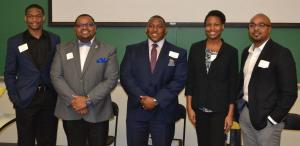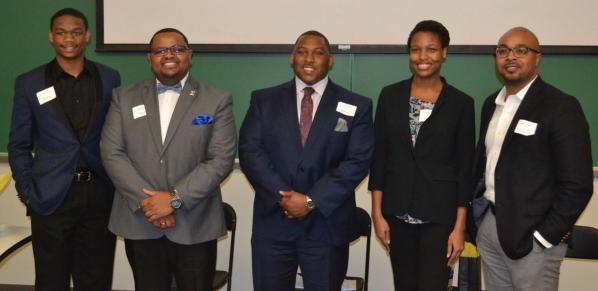Watauga Democrat–In observance of Black History Month in February, the Walker College of Business at Appalachian State University hosted a panel discussion on workplace diversity on Feb. 1.
Four panelists — all of whom have been a student at ASU at one time or another — talked about their experiences being an African American in the workforce.
Panelists were Houston Sloan, correspondence and marketing coordinator for Samaritan's Purse; Dylan Galloway, town manager of Cottage City, Md; Troi Robinson-Moss, graduate student at ASU; and Kendrick Tillman, employee in Corporate Treasury Finance for Wells Fargo.
The discussion was the second annual Courageous Conversations event — an initiative of the Walker College's Inclusive Excellence Team. It was also co-hosted by the Mu Upsilon Chapter of Kappa Alpha Psi Fraternity, Inc. and the Alpha Alpha Rho Chapter of Phi Beta Sigma.
ASU student Dejon McCoy-Milbourne served as the event's moderator, asking the panelists questions concerning the diversity initiatives at their workplace, unconscious bias at work and workplace diversity quotas.
Sloan said he wasn't aware of any diversity initiatives at his place of employment and Robinson-Moss said she weren't aware of any at her former employer — Toshiba Global Commerce Solutions and Research.
Galloway said that Cottage City has a population of roughly 40 percent African American, 40 percent Hispanic and 20 percent Caucasian — with a motto of "unity in diversity."
He said while his current place of employment celebrates diversity, he has experienced interviewing with organizations that don't have diversity initiatives. Out of the town/city/municipal managers in North Carolina, Galloway said fewer than 15 are African American.
Galloway said he plans to start accepting interns at his office to help prepare younger generations for scrutiny they may face in the workforce.
"I don't want to get caught up in the false reality of the grass is greener on the other side when there's going to be challenges you can't help," Galloway said.
Tillman said since he works for a bigger company in corporate finance, his workplace also has diversity initiatives. He said Wells Fargo offers various groups – such as one for Latin Americans or one for African Americans — for people to join.
The panelists also addressed unconscious bias they've faced in the workplace. Robinson-Moss said in a former work setting, her non-African American coworkers would rephrase what she said and add a "Z-snap and a head roll" to appear African American.
"I have a neutral accent," Robinson-Moss said. "They only did it when they were speaking towards me. I don't know if they were trying to relate to me or didn't know how offensive it was. Some people just honestly don't know."
Galloway said he has noticed unconscious bias when it comes to "ethnic sounding names" and has witnessed people tossing aside applications because of a name. He said while his name is spelled "Dylan," it's not said the way it's spelled. If his name was spelled the way it's pronounced, he said he probably wouldn't have gotten into the door of as many interviews.
Galloway also mentioned he witnessed a receptionist refusing to assist an African American man because she said 'they're just going to go out and not pay taxes' because of an unconscious bias.
"I'm a bigger black male," Galloway said. "We have to be more gentle whenever we're in public. We can't be running around in hoodies getting exercise. Unfortunately, we live in an age that people of all color are being shot. We have to be aware of our surroundings."
The group talked about diversity quotas in their workplace and the correct way to make sure everyone feels included. They all agreed that having an Affirmative Action plan in place to create diversity is important; however, they said having a retention plan to keep the minority groups is crucial.
Tillman said something he had noticed was that companies were bringing in a minority to reach their quota or target diversity number, but not having any retention effort or way to help coach the person.
Galloway said the conversation needs to change from quotas to talking about representation and making sure everyone "has a seat at the table."
"You hire Johnny because you need (diversity numbers). Johnny didn't cut it because you didn't coach him or he's in the wrong role and you let him go," Tillman said. "Now you think everybody that looks like Johnny isn't going to perform well."
Sloan added that these type of panel discussions should continue and help to educate the public on issues of which they're just not aware.
"You may be biased in a way and not realize you are," Sloan said. "If I was a student, I would love conversations to help me grow, help others grow and help others be educated in these particular areas."
View the original article at wataugademocrat.com.

